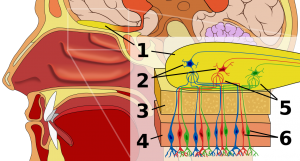
Cooking is one of my passions. As with many things in my life I am self-taught having undertaken a blitzkrieg education soon after I got married. While I have developed into a better than average cook, I have never been able to improve on a decidedly weak sense of smell.
Not smelling well means my taste buds also suffer as smell— the first of our senses to develop and functioning in utero—is responsible for seventy five percent of the impression a flavor has. While smell is our first sense to develop it isn’t everlasting. We smell best in our late twins and go downhill from there.
Smell is the most sensitive of our senses remaining in our memory for long periods. On the flip side our sense of smell gets acclimated to an environment quite quickly. The intensity of how you smell something when you first enter a room will soon dissipate.
Every person has a distinct smell sort of like a fingerprint except for twins who smell exactly alike, which is kind of cool and kind of weird. There can definitely a heightened emotional connection to smell, at least for me, because even though I don’t have a good sense of smell my father’s scent might the thing I remember most about him.
Smell also factors into many survival instincts in interesting ways. When it comes to furthering the species we are hard wired to find the smell of our parents as unattractive. We basically emit an anti-incest scent. This probably happens sometime around puberty when the first whiff of body odor often makes an appearance.
To be honest, not having an acute olfactory awareness can have its advantages, especially when you live in a one and a half bedroom apartment with a wife, two kids, two cats and a dog.
***
